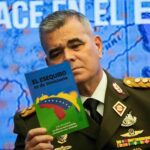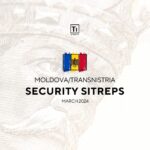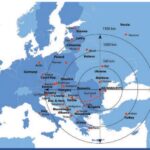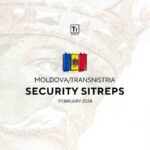Situation Report – Democratic Autonomy has been declared in the Niniveh governorate town of Shengal (better known as Sinjar). This announcement spiked furry at Ankara, distress at Baghdad and anxiety at Erbil that has an independence referendum scheduled for this Autumn. There is an utmost potential that the tinderbox of ethnic, sectarian and regional rivalries of Sinjar could escalate in a battlefield orchestrated by regional stakeholders intending to prevent the independence referendum from taking place.
The Declaration of Shengal/ Sinjar
The declaration came at a press conference attended by Shengal Democratic Autonomous Assembly Co-chairs Hisên Hecî Nefso and Rîham Hıço, Democratic Administration Board Co-chairs Hecî Hesen Pîso and Nehlê Yusif Hefsun, Deputy Co-chair Yardımcısı Kurdê Elî Ezîz, YBŞ (Shengal Resistance Units) Commander Seîd Hesen Seîd, Êzîdxan Asayish member Faris Herbo Xidir and Shengal Youth’s Assembly Co-Spokesperson Îbrahîm Omer, according to ANF (you can find the full communique here).

Press conference held by the Shengal Democratic Autonomous Assembly through which autonomy was proclaimed for Sinjar/ Shengal.
The declaration invoked the right of the Yezidi/ Êzidîs people for self-determination, mentioning their “most ancient faith and cultural society in history” because of which they “have suffered repeated genocides”, especially mentioning the ethnic cleansing, forced conversion, sex slavery and mass killing at the hands of Da’esh (ISIS). The tragedy began in early 2014 when ISIS was emerging in both Iraq and Syria; in March 2014, the jihadists captured the town of Sinjar administered by the Kurdistan Regional Government (KRG) but majority populated by Yazidis. The later, took shelter on the near-by Sinjar mountain, becoming encircled and under siege from the terror group. ISIS and its radical and puritarian interpretation of Islam considers the Yazidis as being “devil worshipers” and therefor legitimizes, in their insane and made-up jurisprudence, to brutalize them as they chose to: from mass-killing to sex enslavement. The tragedy was designated as a genocide by the United Nations, the United States (by both Trump and Obama administrations) and many other countries.
To their defense came the United States that deployed in August 2014 Special Forces and advisors, alongside the British Special Air Service (SAS) to asses options and plan an evacuation of the Yazidis from Mount Sinjar, sparking the first air strikes conducted by the Pentagon against ISIS. On the ground, salvation came through the Kurdish factions as the KRG’s rulling party KDP, and its military force, the Pashmerga but also rival Marxist guerilla and outlawed PKK-backed by the PUK – the opposition party. Sinjar was liberated in October 2015, lifting the siege on the Yazidi population and also cutting a major supply route from Raqqa (ISIS’s capital) to Mosul (ISIS’s largest city). Since then, both Pashmerga and PKK began contesting the turf. The fighters of PKK backed the formation of the Sinjar Alliance, a joint command room between the the Sinjar Resistance Units (YBŞ), the Êzîdxan Women’s Units (YJÊ) – the two Yazidi militas formed in 2007 after the exact model of the Syrian Kurdish YPG/ YPJ groups – and themselves. While the Pashmerga inflicted political pressure backed by their military foothold in the area, somewhat also enforcing Ankara’s protests regarding PKK’s presence in the area. There have been times when the two camps clashed in the Sinjar area, forcing additional displacement from the Yazidis.
Close to 10,000 Yazidis have been killed, kidnapped by ISIS, even more than this have been also affected or displaced. A study published in academic journal PLOS Medicine found that 3,100 were murdered, with almost half executed by gunshot, beheading or being burned alive, while the rest died from starvation, dehydration or injuries during the Da’esh siege on Mount Sinjar. While 6,800 of them have been kidnapped, most of them (women) being forced into sex slavery. The same studies suggest that over 2,5% of the estimated 400,000 population of Yazidi has been exterminated by ISIS.
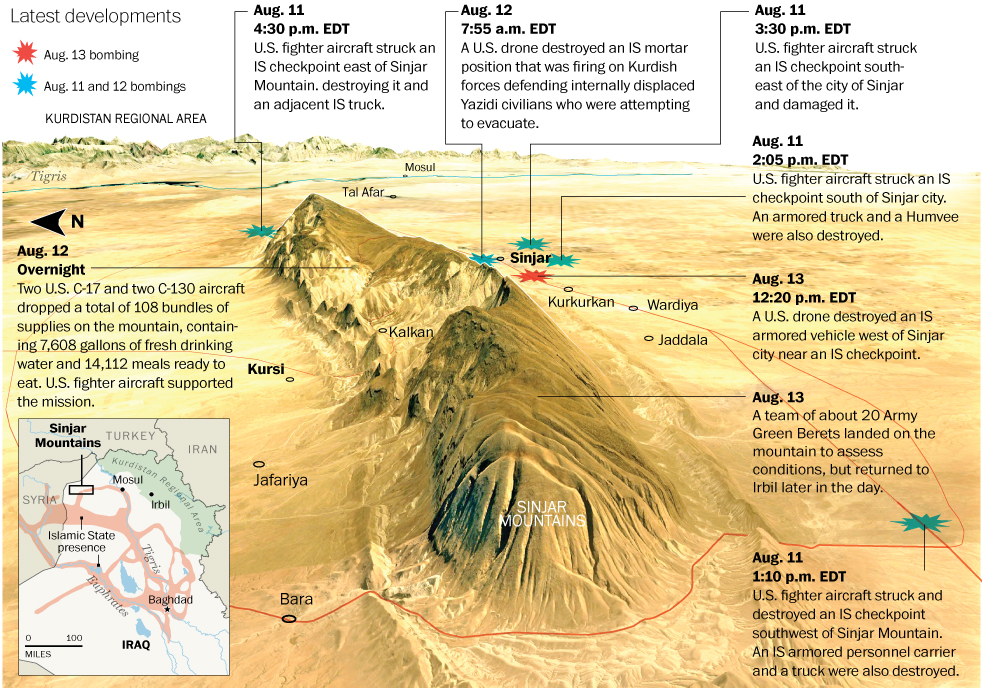
Map of the situation in Mount Sinjar (2014). Source: unknown
Sinjar: A Second ‘Qandil’ in the Eyes of Turkey
Turkey fears that a Sinjar controlled by the PKK could become a strategic node for a permanent logistics and paramilitary corridor from the PKK’s homebase in the Qandil mountains (north-eastern corner of Iraqi Kurdistan bordering Iran) all the way to the Syrian boundary, providing the outlawed group with a superior capacity to move and assert its interest against Turkish national security concerns and in regards to the Kurdish population in northern Syria, where they benefit from an allegiance and organizational link with the YPG, Iraq and overall the entire region coordinated through KCK format established as of 2004.
Ankara is also pitted in a difficult situation, as their primary partners in Iraqi Kurdistan, the Kurdistan Democratic Party (KDP) has not backed down in face of pressure from holding the announced independence referendum. This ballot will also involve Sinjar, regardless of its disputed status in relation with the Iraqi government from Baghdad, therefore the KDP needs a sensitive approach towards the Shengal Democratic Autonomous Assembly in order to secure their cooperation in the interest of expanding the referendum. On the other hand, both President Erdogan and Prime-Minister Yildirim announced that Turkey will not let Sinjar become “a second Qandil” referring to the safe-heaven held by the PKK on the Iraqi-Iranian border from which the outlawed group has launched repeated attacks in Turkey’s southeastern province for the past decades. They are currently awaiting for the KDP to solve the issue as promised, while not resisting to tease that a second, military option also exists.
Worth to mention that KDP hosts a significant amount of Turkish troops in the area and that Ankara has a training camp at Bashiqa where hundreds of Sunni tribesmen and Pashmerga soldiers have been trained. In a bid to prevent further Turkish actions, the KDP and its Syrian Kurdish allies sought in March to dislodge the PKK from Khanasor by entering YBS controlled area, but failed. Later on in April 2017, Turkish fighter jets targeted PKK and YBS militants in the area, but ended up killing 6 KDP Peshmerga instead.
Turkish President Recep Tayyip Erdogan asserted n August 21st that his government is considering joint military action with Iran against the PKK. “[The] PKK terror organization has a foot in Iran,” Erdogan said, speaking to reporters ahead of an official visit to Jordan. “They always cause harm to Iran and us. … We believe if the two countries cooperate, we can reach a conclusion in a much shorter period of time.” Iranian-backed PMU’s are kilometers away in northern Iraq, both at the Syrian border after they secured the Umm Jaris crossing, and at Tel Afar, where together with the Iraqi Security Forces (ISF) have just launched an offensive to liberate the ISIS stronghold of Tel Afar, as the post-Mosul nexus. More on the situation post-Mosul in this analysis.
On August 24th, Nationalist Movement Party (MHP) Chairman Devlet Bahçeli issued two major threats in regards to the situation in Northern Iraq“Turkey should cooperate with Iran to destroy PKK terrorists located in Northern Iraq,” In relation to the upcoming referendum which will be held by the Kurdistan Regional Government (KRG) in Northern Iraq, Bahçeli said that it is unacceptable and that it should be considered as a cause of war for Turkey.

Brief Geopolitics of Kurdistan: Can It Break Free of the Constraint Theory?
On June 7th, 2017, after high-level consultations between political factions, President of the Kurdistan Regional Government (KRG), Masoud Barzani announced that a date has been set for the Independence referendum to take place: 25th of September. KRG already enjoys a large extent of self-governing features such as an own parliament, armed forces and jurisdiction, however the relations with the central government with Baghdad has always been sour.
(a) The rule of Saddam Hussein threatened the mere existence of the Kurds in northern Iraq, exacerbating armed conflicts and insurgencies in face of chemical attacks and attempted genocides by the Ba’ath authority. The conflict was in a dead-end as the many negotiations between KDP, PUK and Ba’ath failed to produce anything than temporary ceasefires. The situation only improved after the United States launched Operation ‘Provide Comfort’ in 1991 which sought to deter Iraqi attacks on the Kurdish population by implementing a no-fly interdiction in the airspace and a safe-zone on the ground which at the mission’s end in 1996, fully established today’s self-ruling Kurdistan Regional Government (KRG).
- In the post-Saddam Hussein era, the divisive Maliki government challenged the economical and political structures and functionality of KRG through its policies. The Maliki cabinet refused to send the block grants that pay for the salaries of the region’s civil servants, or have boiled tensions over the city of Kirkuk at a near-war level, especially since the Iraqi Security Force (ISF) abandoned their positions when ISIS stormed Northern Iraq, creating a vacuum,that in Kurdish eyes, served the area on a plate to the jihadists while the Iraqis were making a run for it. Although deployment of the Pashmerga and the appointment of the comprise government of Abadi loosened up the situation, disagreements remained due to the Kurdish advancement outside the territory of KRG essentially annexing new turf under their jurisdiction, and in regards to the oil exports and revenue.
- Of course, most of Baghdad’s hostility towards the KRG post-2003 came from the oil disputes, which is also strongly related with the status of Kirkuk. As the central government applies ultra-centralized policies in regards to oil production and exports, the KRG tried to by-pass the Constitution and independently sell oil through separate deals (as with Turkey, for example) while not returning any taxes or revenues to Baghdad, as long as possible. This stirs a never-ending line of blames and justifications between the two intra-state actors heavily dependent on oil exports. In reality, Article 111 and 112 from the Iraqi Constitution related to energy issues clearly states that ‘oil and gas shall be propriety of all Iraqi people in all regions and provinces’ […] ‘The Federal Government should jointly manage oil and from current fields with the governments of the producing regions and provinces, provided that the proceeds from these shall be allocated fairly and proportionately with the population distribution throughout the country’. KRG is entitled to 17% of these revenues.
(b) Iraq’s oil politics is a decisive input in understanding the state of affairs within and around the country. In 2003 the estimated capacity would have put Iraq in equal terms with Saudi Arabia, or even past it taking into account the vast potential of unexplored reserves. This Brooking analysis lists some of those statistics: the Petroleum Economist Magazine estimates that there were as many as 200 bbl of oil in Iraq; the Federation of American Scientists estimates 215 bbl; a study by the Council on Foreign Relations and the James A. Baker III Institute at Rice University claimed that Iraq has 220 bbl of undiscovered oil; and another study by the Center for Global Energy Studies and Petrolog & Associates offered an even more optimistic estimate of 300 bbl. Fellow partners from OPEC fell threatened by Iraq’s vast potential and they have good reasons to be so.
(c) World Oil informed two months ago that Iraq was the top crude supplier to India for a third month in May, shipping 1 MMbpd. Iraqi supplies accounted for 23% of India’s purchases last month, up from an average 19% in the previous four months, while Saudi Arabia’s share fell by 1% to 17%, the data showed. Oil producers are facing increasing competition in major markets like China and India as OPEC as those are the fastest-growing and potentially-largest consumer markets. India’s $2-trillion economy imports more than 80% of its crude requirement and the IEA expects it to be the fastest-growing consumer through 2040.
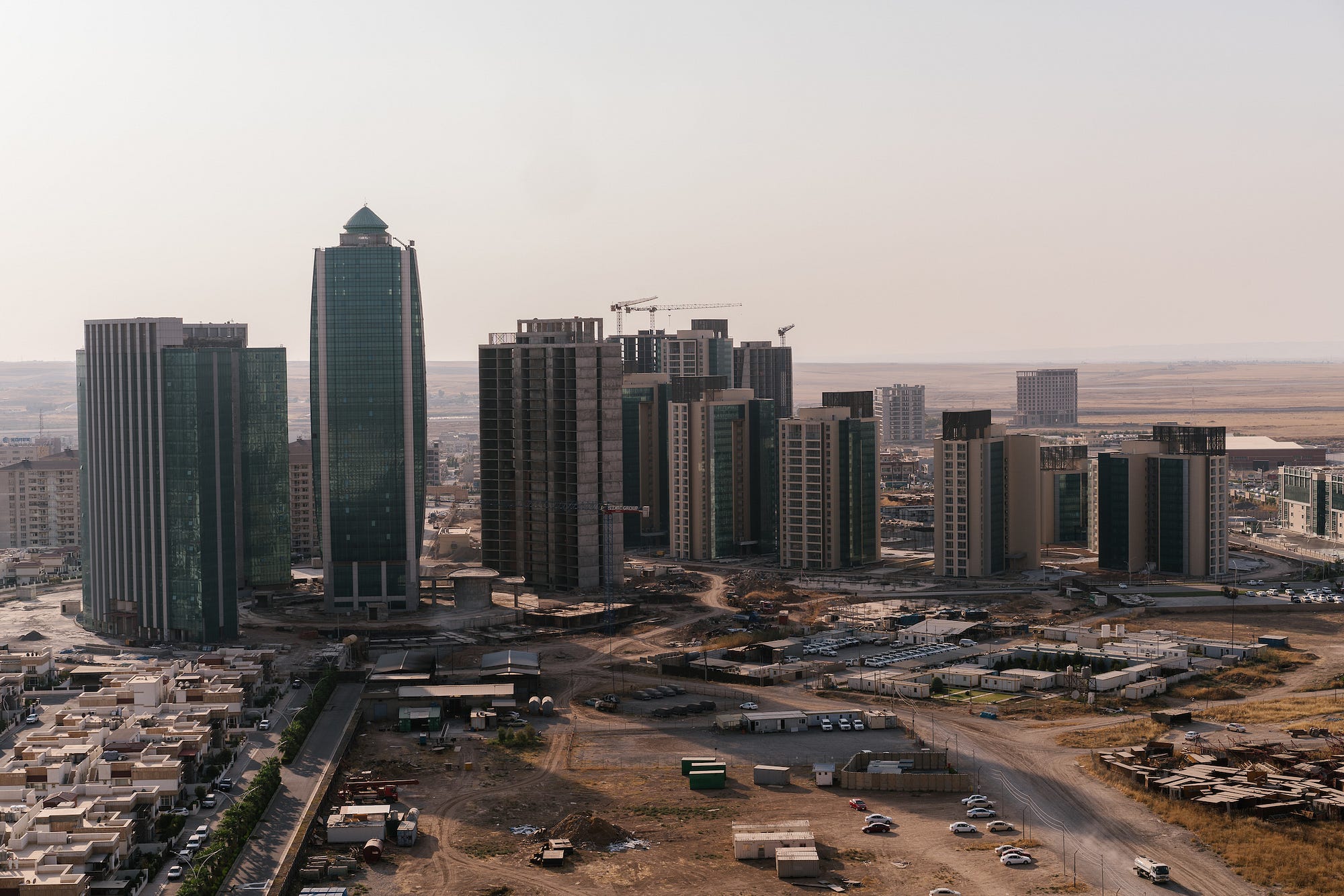
view of Erbil, the capital city of Iraqi Kurdistan, as seen from Hotel Divan, a popular spot for the Kurdish elite and foreign businessmen. In the foreground is the long-stalled development Empire World, a casualty of the economic crisis now facing the region. (Jake Naughton/GlobalPost Investigations)
(d) Deepening our understanding of the oil problem, it should be mentioned that a significant part of Iraq’s wealth and deposits are also situated in the North, both in Iraqi Kurdistan and in the ‘territorial belt’ disputed with Baghdad. According a highly-insightful analysis from the Revenue Watch Institute, the southern-most region of Basra accounts for 59% of Iraqi oil reserves (65 bbl), Kirkuk comes second with 12% (13 bbl), while KRG’s total is only 3%, including the oil fields in Erbil, Dohuk and Suleymaniyah. Looking in stark contrast, northern Iraq did not enjoy the same stability as the southern lands, namely Basra where skyscrapers and luxurious malls are being built, a significant portion of the oil fields in Kirkuk are damaged or outdated and only operate at half their capacity. Kirkuk’s joker card its the undiscovered/ unexploited deposits which maintain optimism and attract investments from international energy giants.
On the other hand, the prospects of KRG-based oil looked fairly pessimistic for investors in the past years, as revisions over some oil fields found more water than oil, reducing the deposit’s projected potential. Consequently, decision makers at Erbil decided to maintain the massive oil fields located in Kirkuk in the post-liberation period. And while energy-reasons are not the most PR-friendly justification, the historical ones are. Kirkuk was a Kurdish majority city up to the rule of Saddam Hussein who forcefully displace them and encourage Sunni Arabs to populate the region instead. Over the course of dozens of years, this social engineering still casts a shadow over Kurdish-Arab Sunni relations.
(e) Geoeconomic-wise, the KRG’s oil potential and independent dealings are conditioned by two complex actors, Turkey and the Iraq. While Ankara holds the soul pipeline towards its industrial port in Ceyhan used as a hub for further exports and transports, benefiting from a somewhat dependency of the Kurds towards their transitional posture, Baghdad controls the roads and pipelines capable of transporting the products to other regional markets or integrated networks of roads. In an exclusive Reuters article, the region’s minister for natural resources, Ashti Hawrami, said that to avoid detection Kurdish oil was often funneled through Israel, transferred directly between Greek commercial ships off the coast of Malta, and decoy ships used to make it harder for Baghdad to track. However Baghdad did fill a lawsuit against Greek company Marine Management Services over its involvement in these dealings. But even to by-pass Baghdad, KRG needed to help of Turkey.
(f) Looking at trade figures, Kurdistan’s Board of Investments informs that imports account for 85% of the estimated US$5.0–5.5 billion of annual external trade in the Kurdistan Region. Most imported goods are consumed in the Region and are not re-exported as value-added products. The largest external trading partner for KRG is Turkey and most of products consists in food and consumables.
(g) Translating this data over the disputed areas and into demographics, the Independent High Electoral and Referendum Commission (IHERC) in Kurdistan reports that:
- 6 million people in the Kurdistan Region and the disputed territories such as the oil-rich city of Kirkuk, Sinjar, Makhmour and Khanaqin have the right to vote in the referendum.
- 48% of the Kurdistan Region’s land is still disputed between Baghdad and Erbil, and some 2.7 million people live in the disputed territories.
End Notes
(1) Looking at these figures we can conclude that for an independent Kurdistan the possession of Kirkuk, Sinjar and other disputed areas is key. However, given Iraq’s and Turkey’s disapproval towards the vote, and subsequently, leverage over Erbil (trade, energy, infrastructure) the referendum could simply result into a sterile non-actionable outcome if the expected “Yes” camp will win. Both Ankara and Baghdad can simply block Kurdish oil exports and isolate the region as wanted, even before talking about a military solution. Turkish Energy Minister Berat Albayrak already said that the referendum would harm energy cooperation with the KRG, which pumps hundreds of thousands of barrels of oil a day to Turkey’s Ceyhan export terminal.
According to the constraint theory, there are a number of clear geographical, statistical inputs that can predict an actor’s behavior, there have been enough cases (example: Turkey’s downing of a Russian jet in 2015) that ignored strong trade ties, energy dependency or political comfort, on the grounds that third effects could overthrow the second ones, and unlock a better prospect. In this logic, while Erbil knows that the referendum could be disastrous for the country’s trade and economics due to geopolitical constraints as immediate secondary effects, it could also judge the long-term prospects as being an opportunity of emergence which is nothing short or rational thinking however dangerous would it be to roam through an adverse Middle Eastern quagmire.
(2) It is not clear if PKK’s influence over the Sinjar Council that recently proclaimed autonomy will exercise any kind of negative effect over the referendum. It may be the case that PKK wants to assert itself in the region before an independent Kurdistan emerges, in a bid to softly challenge KDP’s authority. However, this uncontrolled enthusiasm could actually put in danger the referendum by attracting a Turkish economic boycott against the KRG, or military intervention targeting the Sinjar Alliance, which is exactly the scenario that Masoud Barzani, KDP President, fears and tries to prevent through a combination of military pressure, shuttle diplomacy and effectively, stalling time. Ankara might not see the proclamation of autonomy in Sinjar as an organic right to self-determination of persecuted Yazidis, but a political instrumentation from the PKK to achieve influence in the area.
(3) Secretary of Defense James Mattis signaled Washington’s nuanced stance on this matter by announcing on August 23rd at Baghdad that they are committed to preserve the unity of Iraq, while the later meeting at Erbil with President Masoud Barzani he only suggested that the dialogue with the Iraqi government should continue on that matter. In addition to this, Iran and Syria also oppose a Kurdish independence in Northern Iraq fearing that a domino effect could vacuum their Kurdish-populated territories as well – also a vital concern of Turkey.
The unanimous decision taken by all Kurdish parties to support the referendum shows a rare moment of Kurdish unity throughout history, which could cancel any external soft-or-smart power effort to disrupt KRG’s affairs.
Founder of T-Intelligence. OSINT analyst & instructor, with experience in defense intelligence (private sector), armed conflicts, and geopolitical flashpoints.

